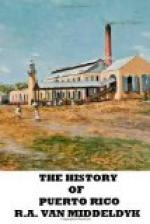* * * * *
Were the Caribs cannibals? This question has been controverted as much as that of their origin, and with the same doubtful result.
The only testimony upon which the assumption that the Caribs were cannibals is founded is that of the companions of Columbus on his second voyage, when, landing at Guadeloupe, they found human bones and skulls in the deserted huts. No other evidence of cannibalism of a positive character was ever after obtained, so that the belief in it rests exclusively upon Chanca’s narrative of what the Spaniards saw and learned during the few days of their stay among the islands. Their imagination could not but be much excited by the sight of what the doctor describes as “infinite quantities” of bones of human creatures, who, they took for granted, had been devoured, and of skulls hanging on the walls by way of receptacles for curios. It was the age of universal credulity, and for more than a century after the most absurd tales with regard to the people and things of the mysterious new continent found ready credence even among men of science. Columbus, in his letter to Santangel (February, 1493), describing the different islands and people, wrote: “I have not yet seen any of the human monsters that are supposed to exist here.” The descriptions of the customs of the natives of the newly discovered islands which Dr. Chanca sent to the town council of Seville were unquestioned by them, and afterward by the Spanish chroniclers; but there is reason to believe with Mr. Ignacio Armas, an erudite Cuban author, who published a paper in 1884 entitled the Fable of the Caribs, that the belief in their cannibalism originated in an error of judgment, was an illusion afterward, and ended by being a calumny[97]. Father Bartolome de las Casas was the first to contradict this belief. “They [the Spaniards] saw skulls,” he says, “and human bones. These must have been of chiefs or other persons whom they held in esteem, because, to say that they were the remains of people who had been eaten, if the natives devoured as many as was supposed, the houses could not contain the bones, and there is no reason why, after eating them, they should preserve the relics. All this is but guesswork.” Washington Irving agrees with the reverend historian, and describes the general belief in the cannibalism of the Caribs to the Spaniards’ fear of them. Two eminent authorities positively deny it. Humboldt, in his before-cited work, in the chapter on Carib missions, says: “All the missionaries of the Carony, of the lower Orinoco, and of the plains of Cari, whom we have had occasion to consult, have assured us that the Caribs were perhaps the least anthropophagous of any tribes on the new continent, ...” and Sir Robert Schomburgh, who was charged by the Royal Geographical Society with the survey of Guiana in 1835, reported that among the Caribs he found peace and contentment, simple family affections, and frank gratitude for kindness shown.[94]




